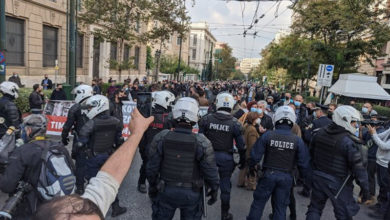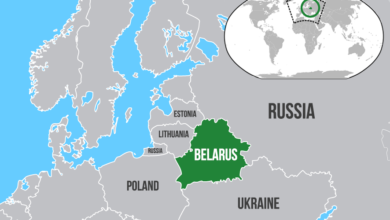In a major development that threatens the political stability of the European Union and the economic stability of global capitalism, the Greek government led by the Coalition of the Radical Left (SYRIZA) announced last Friday that it would hold a referendum on the harsh terms of a cash-for-austerity deal offered by the “Troika”. The referendum will take place July 5, although there is an outside possibility that it would be canceled in the event of a breakthrough in Troika-Greece negotiations.
The Troika, now often referred to as “the institutions”, is composed of the International Monetary Fund, European Union, and European Central Bank. Since 2009, the Troika has imposed devastating measures that attack the most fundamental rights of poor and working people in Greece – in return for bailout money, which almost all goes directly back to the big banks.
On Tuesday, the country missed a 1.6 billion Euro payment to the IMF. While this is does not technically constitute a default because the money was not due to a private investor, the Greek government is now effectively bankrupt. The country’s credit rating has been downgraded.
Panic is quickly spreading across the economy, and it is far from guaranteed that it will be confined to Greece. European officials denied the Greek government’s request to extend the bailout program, which expired on Tuesday.
After the referendum announcement, huge lines immediately began forming at ATMs across the country, which quickly ran out of cash. The government then announced the extraordinary measures that banks would be closed until the referendum, and a 60 Euro limit would be imposed on ATM withdrawals.
The big financial institutions in Greece continue to operate only because of emergency aid from the ECB, which has so far refused to increase this assistance. Greek authorities are desperate to prevent a run on the banks, but after the missed IMF payment there will be additional pressure on the ECB to cut off aid.
The leadership of the SYRIZA government, which includes the anti-bailout, anti-immigrant party Independent Greeks as a junior partner, finds itself in a dilemma. On the one hand, it received a clear electoral mandate to break the cycle of debt and austerity that has left the Greek working and middle classes destitute. In his speech announcing the referendum, Prime Minister Alexis Tsipras stated that the Troika’s terms: “[W]ill add new unbearable weight to the shoulders of the Greek people, and that will undermine the recovery of the Greek economy and society–not only by fueling uncertainty, but also by further exacerbating social inequalities.”
On the other hand, SYRIZA assured the people that it would not leave the Eurozone, arguing that the Troika was bluffing and could be forced to ascent to a “European debt conference” that would write off much of the country’s debt. In the same speech, Tsipras reaffirmed his government’s commitment to the process of continental capitalist integration by referring to the Troika’s demands as “An ultimatum that contravenes Europe’s founding principles and values. The values of our common European project.”
The SYRIZA government ended up offering major concessions that include regressive taxes, privatizations and pension cuts that blatantly violate its pre-election promises. This proposal was submitted just in time for the June 22 meeting of Eurozone leaders, and it appeared that a deal was imminent. Tsipras and the rest of the leadership hoped that it would be enough to appease the Troika while not going so far that its internal left wing, which is growing in influence, would refuse to vote for it in parliament.
Greek people refuse to accept surrender
In short, the center could not hold. Tsipras’ concessions were widely hailed as a breakthrough, but not unconditionally accepted by the other Eurozone states. The leadership of SYRIZA was not able to sell the concessions to enough of its parliamentarians or Greek society at large.
Upon learning of the terms the government had offered the Troika, SYRIZA members and Deputy Speaker of parliament Alexandros Mitropoulos remarked, “My personal view is that these measures cannot be approved in a vote. They are extreme and against social justice.” Panagiotis Lafazanis, Minister of Productive Reconstruction, Environment and Energy and leader of the Left Platform faction of SYRIZA, was another key voice against concessions. After the referendum was called, he was quick to call for a decisive rejection of the Troika’s terms, saying “[A ‘no’ vote] will be a big yes to a new era of reconstruction and progress” and uniquely refused to accept the media narrative of the Euro or chaos, insisting that the real “dilemma for the people is whether they will live better.”
A referendum was the only way for the SYRIZA leadership to avoid taking responsibility for a Greek exit from the Eurozone while avoiding an open conflict from breaking out within the party’s own ranks.
Underpinning the dissent from the SYRZIA left wing is the proven ability of the Greek working class to engage in militant struggle. The mass movement has been at a low point recently as the center of gravity shifts from the streets to the negotiating table, but the experience of the past several years, and more broadly the entire post-World War Two period of Greek history, affirms the possibility of an explosion.
The day before the missed IMF payment, tens of thousands flooded the streets outside of the parliament to denounce the Troika’s brutal austerity and call for a “no” vote in the referendum. Should this type of mass mobilization continue, poor and working people may quickly find themselves in a position to direct the course of events. It is possible that such a renewed upsurge could go beyond demands relating to the immediate situation and threaten the entire structure of class rule in Greece.
The legitimacy of the Greek state following the overthrow of the military dictatorship in 1974 has in large part been premised on its membership in the “European project” that cements Greece’s place as a developed, western nation. Should the country leave the Eurozone, this rationale would go up in smoke. In a post-exit reorganization of politics, a mobilized working class can intervene forcefully when the question is posed: Who will rule Greece?
A turning point for the European Union
The Troika did little to help Tsipras overcome domestic pressure. In fact, they drove a remarkably hard bargain, refusing to accept the major concessions offered by SYRIZA and even correcting a missing capital letter in their counter proposal. This can be largely attributed to the significant and growing section of the European ruling class that would actually prefer a Greek exit from the Eurozone.
This camp is particularly strong in Germany, the most powerful imperialist state in the European Union. A rift has opened up in recent days between Finance Minister Wolfgang Schaeuble, who seems to prefer a managed Greek exit, with Prime Minister Angela Merkel, who takes a hard line but has overriding political concerns about the political precedent that would be set by a country departing from the Eurozone. The thinking goes that if Greece and possibly other weaker countries are pushed out of the Eurozone, the remaining states would be able to pursue more rapid financial integration without having to deal with the consequences of uneven economic development, particularly as it relates to access to credit.
This, however, comes with a high degree of uncertainty. The U.S. ruling class is strongly against this approach, and both President Obama and Treasury Secretary Jack Lew are intervening in favor of a compromise that prevents a Greek default.
Prime Minister Tsipras has called for a “no” vote in the referendum, but has not posed this in opposition to Greek membership in the Eurozone. The SYRIZA leadership is instead presenting the vote as an opportunity to increase the bargaining power of the government, not set Greece on a radically new course. In fact, in a desperate attempt to reach an agreement before the IMF payment was due, the Greek government sent a proposal to the Troika offering to enter into a new 2-year bailout program in return for a restructuring of debt.
The Communist Party of Greece (KKE), has consistently advocated for a break with the European Union on a socialist basis and has carried out mass mobilizations in recent weeks, but its overall strategy is in fact restraining the development of a revolutionary situation. So far the party has issued vague calls for its supporters to spoil their ballots in the referendum. The KKE has polled around 5 percent support – in a hotly contested vote such as this one the spoiling of so many ballots from class-conscious workers can give a dangerous boost to the “yes” side that urges the Greek masses to accept blackmail.
This is in line with the Communist Party’s sectarian conception of revolutionary strategy, which offers united struggle only on the condition that others first accept its leadership and program. In practice, this has meant that at critical moments of struggle (including this referendum) they have stood apart from the larger movement against austerity rather than contending for leadership from within it. They offer biting criticism of SYRIZA on the basis that workers will come to them once they have learned the hard way.
Imagine, however, if the KKE followed the Leninist strategy of demonstrating through its own practice and principled unity the insufficiency of the reformists. If the party had offered critical support to SYRIZA in parliament, which is two seats short of being able to form a majority on its own, it would have gained a central platform to build a revolutionary pole of attraction. When Tsipras was preparing to offer massive concessions to the Troika, the KKE would have been able to act as the spokesperson for millions of Greek workers by threatening to bring down the government if austerity was agreed to.
The present political and economic crisis, manifested in the referendum, presents an unprecedented opportunity for revolutionary forces in Greece. A victory for “no” will expand these opportunities. An approach that stresses unity in the mass struggle, tactical flexibility, and a principled commitment to revolutionary change has time and again proven to be a winning formula for workers and the oppressed.





